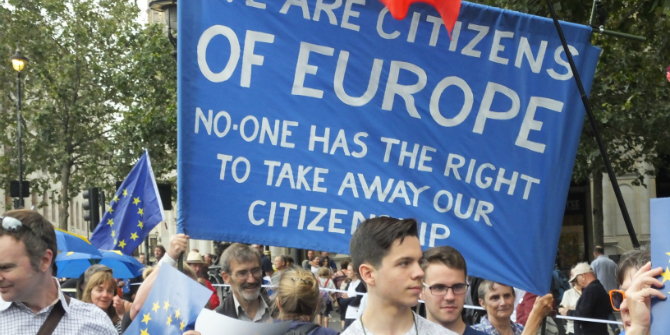 Despite various opt-outs from European directives, Britain has now greater protection for workers than ever before. In principle, the UK could, on leaving the EU, retain all the employment rights and practices established through her long membership. There are, however, many risks that Brexit poses for employment relations, writes David Marsden (LSE).
Despite various opt-outs from European directives, Britain has now greater protection for workers than ever before. In principle, the UK could, on leaving the EU, retain all the employment rights and practices established through her long membership. There are, however, many risks that Brexit poses for employment relations, writes David Marsden (LSE).
In principle, Britain could, on leaving the EU, retain all the employment rights and practices established through her long membership. These were agreed collectively among the member states, including Britain. Over recent decades, there has been considerable convergence of practice among firms operating in Britain and those in other EU countries. Britain now has a form of works councils, although their powers are considerably weaker than those in Germany and France. Despite various opt-outs, and implementation delays, we now have greater protection for part-time, temporary and posted workers, and in the Blair-Brown years, Britain was leading the way in modernising the approach to minimum wage setting. Britain even seemed to be moving towards something of the German approach to workplace industrial relations where enhanced consultation and information sharing rights have built an approach to handling workplace issues from a problem-solving perspective rather than the traditional British market bargain which sets one party against the other, as if a gain for one party could come only at the expense of the other. Under German law, managers and works councils are obliged to ‘co-decide’ many workplace issues, and this approach has spilled over into many areas of German economic life. Problem-solving rather than win-lose negotiation.
How far such developments will weather the storm of Brexit depends very much on which party is in power, and for how long. No doubt Labour, led by Jeremy Corbin, would maintain and probably strengthen workers’ employment rights and protections. But there remains a question as to how far it would support the more ‘problem-solving’ approach to employment relations, which is good for productivity and attracting inward investment and jobs, but harder to sustain in the current deeply divided environment.
Perhaps Theresa May shares some of these concerns, to judge by the content of her ‘Downing Street speech’ of July 2016, in which she appeared to advocate a stronger employee voice on company boards as a remedy to ‘boardroom excesses’. However, she has allowed even the modest proposals in her government’s Green Paper on corporate governance reform to be diluted to mere exhortation, under pressure from employers and from her hard-line Brexit supporters. Even her ‘soft Brexit’ allies in the Cabinet have supported spending cuts, which have seen restrictions on employee access to employment tribunals and cuts for Citizens Advice Bureaux, two channels by which aggrieved employees could enforce their legal rights. As unions have declined, these channels have assumed greater importance.
 Photograph by Clem Rutter, Rochester, Kent.
Photograph by Clem Rutter, Rochester, Kent.
Many of the ‘hard Brexiteers’ have a strong intellectual and political commitment to free markets. Complete free trade, and ‘Canada +++’, only really make sense in the long-run if all markets are competitive, including labour markets. Yet many of the hard Brexiteers draw their support from voters who wanted to restrict the supply of labour from immigration. In a post-Brexit government, if the former gain the upper hand, it is likely that their free market deregulatory agenda will consign many of the recently introduced employment protections to the ‘bonfire of regulations’. This would be bad for workers, but could also exacerbate the social divisions that contributed to the Brexit vote in 2016.
Jacques Delors, who was the architect of ‘Social Europe’, saw that establishing the Single Market for goods, services, capital and labour depended on socialising many of the adjustment costs, especially for workers. That meant stronger legal protections for workers, and strengthening workers’ voice in decisions on economic change through enhanced worker representation and social dialogue. For that reason, he proposed that ‘Social Europe’ was an essential accompaniment to the ‘Economic Europe’ of the Single Market. Most workers lack the resources to adapt to rapid economic change, and cannot spread their risks in the way that their employers can. Leaving workers to shoulder much of the adjustment cost is unfair, but it is also likely to trigger a hostile political reaction, of the kind we can see in the rise of populism in the Brexit vote and across Europe today. We jettison the enhanced employment rights of Social Europe at our peril.
This post represents the views of the author and neither those of the LSE Brexit blog nor of the LSE.
David Marsden is Professor of Industrial Relations at the LSE.






